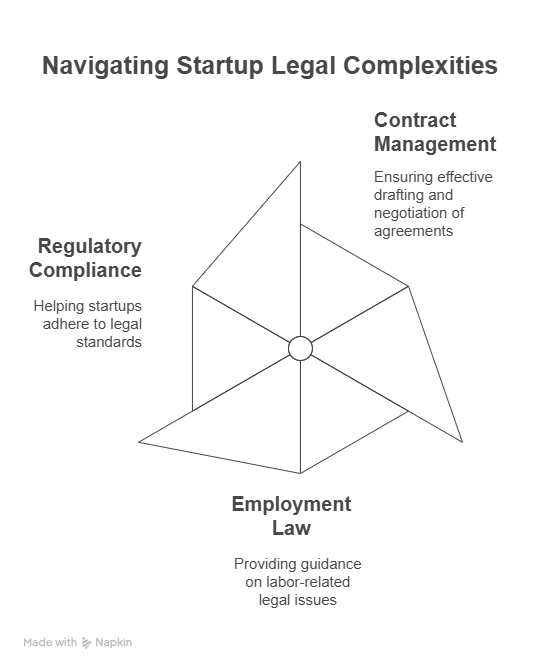Navigating the complex world of legal requirements can be daunting for entrepreneurs. However, having the right legal foundation is crucial for protecting your business and ensuring its success.
Did you know that a significant number of startups face lawsuits due to inadequate intellectual property protection? This can lead to costly settlements and damage to their reputation. With the right legal guidance, you can avoid such pitfalls and focus on growing your business.
As a startup founder, it’s essential to understand the importance of legal guidance for entrepreneurs. By doing so, you can make informed decisions and avoid costly mistakes. In this article, we’ll provide essential tips on choosing the right business entity and protecting your intellectual property, helping you establish a solid foundation for your venture.
Choosing the Right Legal Foundation for Your Startup
As a startup founder, selecting the right legal framework is essential for protecting your business and personal assets. A well-structured legal foundation not only safeguards your venture but also enhances its credibility and attractiveness to investors.
Business Entity Options: LLC, C-Corp, S-Corp, or Partnership
Choosing the appropriate business entity is a critical decision that impacts your startup’s tax obligations, liability protection, and ownership structure. Options include LLC, C-Corp, S-Corp, and partnership, each offering distinct advantages. For instance, an LLC provides personal liability protection and pass-through taxation, while a C-Corp can attract investors by issuing stock. Consulting with a startup attorney can help you navigate these options and ensure your business is properly established.
Founder Agreements and Equity Distribution
Founder agreements and equity distribution are vital components of your startup’s legal foundation. These agreements define the roles, responsibilities, and ownership percentages of the founders, helping to prevent future disputes. A legal consultation for startups can guide you in drafting these documents to ensure clarity and fairness among founders.
Creating Comprehensive Operating Documents
Comprehensive operating documents, such as bylaws and operating agreements, outline the management structure and operational guidelines for your company. These documents are essential for maintaining order and ensuring compliance with regulatory requirements. By establishing clear operating procedures, you can mitigate risks and foster a more efficient business environment.
Protecting Your Startup’s Intellectual Property
Intellectual property protection is a cornerstone for startups looking to establish a strong market presence. As a startup, your innovations and creations are likely your most valuable assets, and safeguarding them is crucial for long-term success.
To effectively protect your startup’s intellectual property, consider the following strategies:
Trademark and Copyright Registration Strategies
Registering trademarks and copyrights is a critical step in protecting your brand identity and original works. Trademark registration helps prevent brand confusion, while copyright protection covers original works such as software code, literature, and art. Legal services for new businesses can guide you through the registration process, ensuring that your brand and creations are fully protected.
Patent Considerations for Innovative Startups
For startups with innovative products or processes, patent protection can provide exclusive rights, giving you a unique selling proposition in the market. It’s essential to understand the different types of patents and the application process to effectively safeguard your innovations.
Non-Disclosure Agreements and Trade Secret Protection
Using non-disclosure agreements (NDAs) and implementing trade secret protection measures can prevent unauthorized disclosure of sensitive information. This is particularly important when working with contractors, partners, or during fundraising activities.
By prioritizing intellectual property protection, startups can maintain a competitive edge and ensure the long-term viability of their business. Seeking legal support for fledgling companies can provide valuable guidance on developing a comprehensive IP strategy.
Essential Startup Legal Advice for Ongoing Operations
Navigating the legal landscape is a continuous process for startups, requiring expert advice on contracts, employment law, and regulatory compliance. As your startup grows, managing these legal aspects becomes increasingly complex.
A startup lawyer can provide invaluable guidance on contract management, ensuring that customer agreements, vendor contracts, and partnership agreements are drafted and negotiated effectively. This helps protect your business from potential legal disputes.

Contract Management and Customer Agreements
Effective contract management involves drafting and negotiating contracts that safeguard your business interests. A well-structured customer agreement, for instance, can help prevent misunderstandings and disputes.
Employment Law Compliance and Contractor Relationships
Employment law compliance is critical for startups, involving adherence to laws related to hiring, firing, and managing employees. Distinguishing between employees and independent contractors is also vital, and small business legal counsel can provide guidance on this matter.
Tax Obligations and Regulatory Requirements
Understanding tax obligations and regulatory requirements is essential for avoiding costly penalties and fines. A startup lawyer can help navigate these complexities, ensuring your business remains compliant.
| Legal Aspect | Description | Importance |
|---|---|---|
| Contract Management | Drafting and negotiating contracts | High |
| Employment Law Compliance | Adhering to employment laws | High |
| Tax Obligations | Understanding and meeting tax requirements | High |
By seeking ongoing legal advice, startups can ensure they are well-equipped to handle the legal challenges that come with growth and expansion.
Conclusion
Navigating the complex world of startup law can be daunting, but with the right guidance, entrepreneurs can protect their businesses and focus on growth. By understanding the importance of startup legal advice, founders can avoid costly mistakes and ensure long-term success.
A well-structured legal foundation is crucial for startups, from choosing the right business entity to protecting intellectual property and managing ongoing operations. By following essential legal tips and seeking the right legal support, startups can mitigate risks and achieve their goals.
Effective startup legal advice can make all the difference in today’s competitive business landscape. By prioritizing legal compliance and seeking expert guidance, entrepreneurs can build a strong foundation for their startup’s future success.
FAQ
What are the most common business entities for startups, and how do I choose the right one?
The most common business entities for startups are LLC, C-Corp, S-Corp, and Partnership. To choose the right one, consider factors such as tax benefits, liability protection, and ownership structure. A startup attorney can help you navigate these options and ensure that your business is properly established.
Why is it essential to have a founder agreement, and what should it include?
A founder agreement is crucial as it defines the roles and responsibilities of the founders, helps prevent future disputes, and outlines equity distribution. It should include details such as ownership percentages, voting rights, and exit strategies.
How can I protect my startup’s intellectual property, and what are the most effective strategies?
To protect your startup’s intellectual property, consider registering trademarks and copyrights, filing for patent protection, and using non-disclosure agreements to safeguard trade secrets. A comprehensive IP strategy can help maintain a competitive edge in the market.
What are the key elements of a comprehensive operating agreement, and why is it necessary?
A comprehensive operating agreement outlines the management structure and operational guidelines for your company. It should include details such as ownership percentages, management roles, and decision-making processes. This document is necessary to prevent future disputes and ensure that your business operates smoothly.
How can I ensure compliance with employment law and regulatory requirements as my startup grows?
To ensure compliance with employment law and regulatory requirements, seek guidance from a startup lawyer or small business legal counsel. They can help you navigate laws related to hiring, firing, and managing employees, as well as distinguish between employees and independent contractors.
What are the benefits of seeking legal consultation for my startup, and how can it support my business growth?
Seeking legal consultation for your startup can provide numerous benefits, including avoiding costly mistakes, protecting your business, and ensuring compliance with regulatory requirements. A startup attorney can offer guidance on various legal matters, helping you make informed decisions and focus on growing your business.

